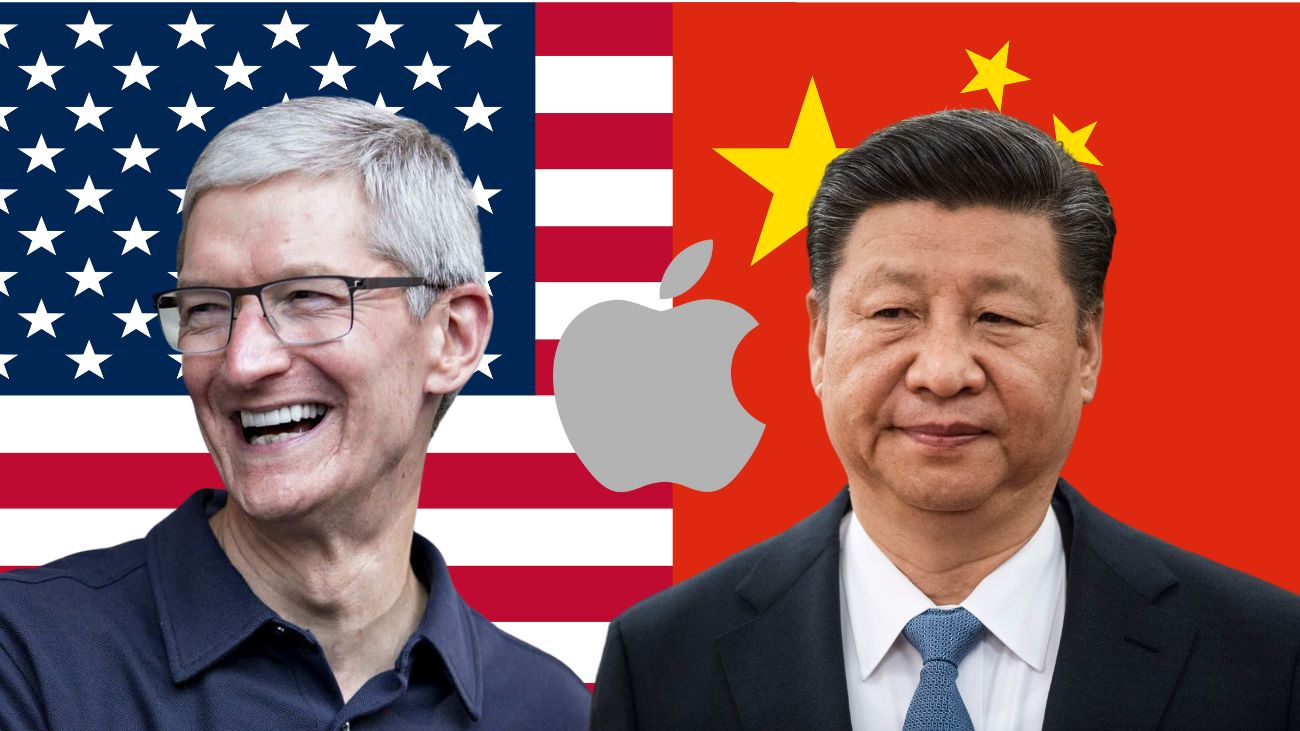Apple, the world’s most valuable company, owes a substantial part of its success to the close relationship it has cultivated with China.
Apple’s Heavy Ties With Communist China
The partnership between Apple and communist China has raised concerns about Apple’s heavy dependence on the Chinese market and the potential implications for its future.
While Apple’s continuous innovation in producing exceptional products is widely acknowledged, the influence of its CEO, Tim Cook, and the company’s operations in China have played a significant role in its remarkable share price growth.
The Financial Times stated, “Apple is a Chinese Company,” highlighting the extent to which China has used its position to exert its political will through Apple and subsequently impact the United States and the rest of the world.
Several incidents stand out as examples of China’s influence over Apple’s decision-making.
One notable incident involved Apple banning the HKmap.live app from its App Store. Initially approved, the app enabled Hong Kong protesters to track police movements. However, after local authorities complained about its use to ambush the police, Apple decided to remove it.
This move sparked concerns about the company’s willingness to comply with the demands of the Chinese government.
In another instance, Apple limited file sharing on iPhones in China following the anti-government protesters’ utilization of AirDrop to disseminate critical leaflets about the Chinese Communist Party (CCP). This decision was partly motivated by a Beijing resident who hung banners calling for the removal of Xi Jinping, the General Secretary of the CCP.
Chinese Communist Party’s (CCP) Censorship With iPhones
Apple’s commitment to user privacy also faced challenges in China. The company introduced a new privacy feature aimed at concealing web browsing data from internet service providers and advertisers. However, this feature was not made available in China, raising questions about Apple’s readiness to compromise on privacy to maintain a strong presence in the Chinese market.
The Chinese App Store witnessed the disappearance of numerous apps, including foreign news outlets, gay dating services, encrypted messaging apps, tools for organizing pro-democracy protests, and even apps related to the Dalai Lama. These actions, perceived as catering to the Chinese government’s censorship demands, drew criticism from advocates of freedom of speech and expression.
Despite Apple assuring Chinese users about the security of their data, concerns have emerged regarding the company’s data center in Guiyang. The center is managed by Chinese state employees, and the digital keys necessary to access the systems are stored within the data centers themselves, raising worries about potential government surveillance and control.
New York Times App Removed
A series of incidents further illustrate Apple’s struggles with censorship in China. The removal of the Quartz news app from the App Store in China due to its coverage of Hong Kong, censorship of the Taiwan flag emoji, and the censorship of songs referencing the Tiananmen massacre and democracy on Apple Music serve as noteworthy examples.
The removal of VPN apps and the New York Times apps from the Chinese App Store underscored Apple’s compliance with the Chinese government’s demands.
These incidents demonstrate the delicate balance Apple must maintain between its business interests in China and its commitment to principles such as freedom of speech and privacy.
During a visit to China, Tim Cook praised Apple’s “symbiotic” relationship with the country, emphasizing how the company and China have grown together.
Over the past two decades, Cook has progressively deepened Apple’s presence in China, culminating in a secretive 2016 agreement to invest $275 billion in the country’s economy, workforce, and technological capabilities.
Apple’s revenue from China contributes nearly a fifth of its total revenue, with operating profits in greater China surpassing $31.2 billion in 2022.
Recognizing the risks associated with its heavy reliance on China, Apple has been gradually diversifying its production and supply chain to reduce its dependency on a single country.
The company has initiated the shift of iPhone production to India, AirPods to Vietnam, and Macs to Malaysia and Ireland, while assembling teams to reconfigure its supply chain. However, these efforts face challenges, as even minor adjustments may provoke retaliation from Chinese authorities, potentially turning Chinese consumers against Apple products.
China’s Leverage With Apple
Investing in Apple has become a geopolitical gamble due to the company’s deep ties with China.
The Chinese Communist Party possesses significant leverage over Apple through its control of manufacturing facilities, access to the Chinese market, and dominance over Apple’s global supply chain.
As tensions between China and the US persist, Apple’s reliance on China poses risks to the company’s future, particularly if China were to restrict its market access or disrupt its supply chain.
Exiting China entirely appears unlikely and could have significant consequences for Apple’s future success.
Further Reading:
Gov. DeSantis to Stop China From Buying Farmland in Florida
Epstein-Tied JPMorgan Chase CEO Jamie Dimon Visits China
U.S. Surveillance Digital ID’s Coming, Similar to China’s Citizen Control
Congress Targets China’s Sudden Takeover of U.S. Farmland
Bill Gates: China is “Huge Win for the World”
Biden Signs Contract With China-Backed N.C. Luxury Camp To House Illegal Children
Largest Pork Producer in U.S. Owned by Chinese Meat Company
Biden Blocks Access to Powerful US Resources
Biden’s Food Shortage And How World Leaders Starved Over 55 Million People
Get the news you need at It’s On News.


